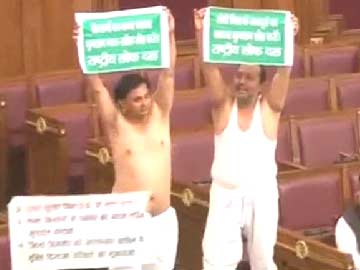
As soon as Governor B L Joshi began his address, Bahujan Samaj Party (BSP) members carrying placards, posters and banners, denouncing the Akhilesh Yadav government, stormed into the well of the House. Two Rashtriya Lok Dal members took off their shirts in protest against the government’s failure to clear farmers’ sugarcane dues. Sudesh Sharma and Veer Pal Rathi astonished members of the treasury benches with their bare chests, as the governor left the House without completing his address.
Amid chaos and din, the House was adjourned for the day.
Ruling party members decried the behaviour of the opposition members with Azam Khan terming them “besharm” (shameless). “They should be ashamed of what they did in the House,” Khan said later. In a vein of sarcasm, Khan said, “I was expecting full exposure.”
Rathi and Sharma, however, defended their behaviour. “We had no alternative. This government has become so insensitive to the problems of sugarcane farmers, that their plight does not move it. Despite making a promise, the government did not ensure the payment of the arrears of farmers,” they said.
The BJP had earlier announced that its members would boycott the address of the governor.
Later, BSP and Congress leaders accused the government of failing completely on the law and order front. “Jungle raj prevails in UP. The government has failed. SP leaders have created terror in the state,” alleged BSP leader Swami Prasad Maurya.
PDP MLA slaps marshal
Peoples’ Democratic Party MLA on Wednesday slapped a marshal in Jammu and Kashmir Assembly as proceedings were marred by unruly scenes.
During discussion of the grants of Agriculture Ministry, PDP MLA Syed Bashir trooped into well of the House to highlight shortage of ration for migrants. But, Speaker Mubarak Gul ordered his removal from the House and as the marshals were leading him out, other PDP MLAs rushed into the well. Amid unruly scenes, the Speaker ordered their eviction from the House too.
RS official heckled
An official of the Upper House was heckled by a section of agitating members on Wednesday. When Secretary General Shumsher K Sheriff stood up at noon to read out a message from the Lok Sabha on passage of the Telangana Bill, TDP member C M Ramesh, who was agitating in the well since morning, tried to snatch the paper from him. As the MP was trying to take the papers from Sheriff, Parliament staff moved in to protect him and the document. “It is very unfortunate. The staff should not be attacked,” Deputy Chairperson of Rajya Sabha P J Kurien said.





Comments
Add new comment